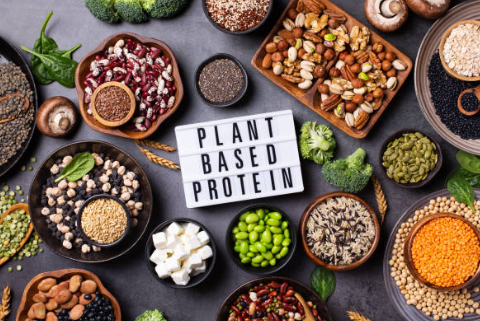Plant-Powered Living




In recent years, the trend towards plant-based diets has gained immense popularity, not merely as a passing fad but as a lifestyle choice rooted in health consciousness, environmental sustainability, and ethical considerations. While the buzz around plant-based eating often focuses on its potential to aid weight loss or reduce the risk of chronic diseases, there’s a deeper narrative that deserves exploration. In this blog, we’ll delve beyond the hype surrounding plant-based diets to uncover their sustainable health benefits, highlighting their impact on both personal wellness and the planet.
Before diving into the benefits, let’s clarify what a plant-based diet entails. Unlike veganism or vegetarianism, which strictly exclude animal products, a plant-based diet emphasizes whole, minimally processed plant foods while allowing for modest consumption of animal products. This flexibility makes plant-based eating accessible to a broader audience, accommodating various preferences and cultural contexts.
Contrary to common misconceptions, plant-based diets can provide all essential nutrients when well-planned. Fruits, vegetables, whole grains, legumes, nuts, and seeds offer a plethora of vitamins, minerals, fiber, and phytonutrients crucial for optimal health. By incorporating a diverse array of plant foods, individuals can meet their nutritional needs while reaping the benefits of antioxidants, anti-inflammatory compounds, and other bioactive substances abundant in plants.
Health Benefits Beyond the Plate
- Heart Health: Plant-based diets have been consistently linked to a reduced risk of cardiovascular disease (CVD). The abundance of heart-healthy nutrients in plant foods, such as fiber, antioxidants, and unsaturated fats, supports optimal heart function. Moreover, plant-based eating patterns tend to be lower in saturated fats and cholesterol, further promoting cardiovascular health. Research suggests that individuals following plant-based diets have lower blood pressure, improved blood lipid profiles, and a decreased risk of coronary artery disease compared to those consuming omnivorous diets.
- Cancer Prevention: Plant-based diets may confer protection against certain types of cancer. High intake of fruits and vegetables, rich in vitamins, minerals, and phytochemicals, is associated with a reduced risk of developing various cancers, including colorectal, breast, prostate, and lung cancer. Additionally, plant foods contain natural compounds with anti-carcinogenic properties, such as sulforaphane in cruciferous vegetables and lycopene in tomatoes, which exert protective effects against cancer formation and progression.
- Type 2 Diabetes Management: Plant-based diets offer a promising approach for the prevention and management of type 2 diabetes. By emphasizing whole, unprocessed plant foods, individuals can regulate blood sugar levels more effectively and improve insulin sensitivity. The high fiber content of plant-based diets slows down the absorption of glucose, preventing rapid spikes in blood sugar after meals. Furthermore, plant foods rich in magnesium, such as leafy greens, nuts, and seeds, have been shown to enhance insulin action and reduce the risk of developing diabetes.
- Weight Management: Plant-based diets are inherently lower in calorie density and higher in fiber compared to animal-based diets, making them conducive to weight management and weight loss goals. Fiber-rich plant foods promote satiety and reduce overall energy intake, leading to sustainable weight loss over time. Additionally, plant-based diets tend to be associated with lower body mass index (BMI) and reduced risk of obesity-related conditions, such as metabolic syndrome and fatty liver disease.
- Inflammation Reduction: Chronic inflammation is a key driver of many lifestyle-related diseases, including heart disease, diabetes, and autoimmune disorders. Plant-based diets, particularly those rich in fruits, vegetables, nuts, seeds, and whole grains, possess anti-inflammatory properties that help mitigate systemic inflammation. Phytonutrients such as flavonoids, carotenoids, and polyphenols found abundantly in plant foods exert anti-inflammatory effects by modulating immune responses and neutralizing free radicals.
- Longevity and Cognitive Health: Emerging evidence suggests that plant-based diets may promote longevity and preserve cognitive function in later life. The Mediterranean diet, characterized by a high intake of plant foods, healthy fats, and moderate consumption of fish and poultry, has been associated with a reduced risk of age-related cognitive decline and neurodegenerative diseases such as Alzheimer’s disease. The neuroprotective effects of plant-based diets are attributed to their rich antioxidant content and anti-inflammatory properties, which support brain health and cognitive function throughout the lifespan.


Gut Health and Plant-Based Eating
- Fiber and Microbiome Diversity: Plant-based diets are typically rich in dietary fiber, which serves as fuel for the beneficial microbes residing in the gut. Fiber can be classified into two main types: soluble and insoluble. Soluble fiber, found in foods like oats, legumes, and fruits, forms a gel-like substance in the digestive tract, slowing down digestion and promoting the growth of beneficial bacteria. Insoluble fiber, found in whole grains, nuts, seeds, and vegetables, adds bulk to stool and supports regular bowel movements. By consuming a diverse range of plant foods, individuals can nourish a diverse array of gut microbes, fostering microbiome diversity, and resilience.
- Prebiotics and Probiotics: Plant-based diets naturally contain prebiotic fibers, which serve as substrates for beneficial bacteria to ferment and produce short-chain fatty acids (SCFAs) like butyrate, acetate, and propionate. These SCFAs play a crucial role in maintaining gut barrier function, regulating immune responses, and reducing inflammation. Additionally, fermented plant foods such as sauerkraut, kimchi, tempeh, and miso provide probiotic bacteria that can colonize the gut and confer health benefits, including improved digestion and enhanced nutrient absorption.
- Reduced Inflammatory Load: Chronic inflammation in the gut is associated with a variety of gastrointestinal disorders, including irritable bowel syndrome (IBS), inflammatory bowel disease (IBD), and leaky gut syndrome. Plant-based diets, rich in anti-inflammatory compounds such as polyphenols, flavonoids, and phytochemicals, help to quell inflammation and promote gut healing. By reducing the intake of inflammatory foods such as red meat, processed meats, and high-fat dairy products, individuals can alleviate gut inflammation and improve gastrointestinal symptoms.
- Improved Digestive Transit: The high fiber content of plant-based diets promotes regularity and smooth digestive transit by adding bulk to stool and preventing constipation. Adequate fiber intake also supports the growth of beneficial bacteria in the colon, which produce short-chain fatty acids that nourish colon cells and promote intestinal motility. By maintaining a healthy balance of gut microbes and supporting efficient digestion, plant-based diets can help alleviate symptoms of digestive discomfort and promote overall gut health.
- Protection Against Gut Disorders: Plant-based diets have been associated with a reduced risk of developing gastrointestinal disorders such as diverticulitis, hemorrhoids, and colorectal cancer. The fiber-rich nature of plant foods promotes bowel regularity and reduces the risk of constipation and diverticular disease. Furthermore, the anti-inflammatory properties of plant-based diets help to protect against the development of colorectal cancer by modulating immune responses and inhibiting the growth of cancerous cells in the colon.
- Enhanced Immune Function: The gut microbiome plays a central role in regulating immune function, with approximately 70% of the body’s immune cells residing in the gut-associated lymphoid tissue (GALT). Plant-based diets support a balanced and resilient microbiome, which in turn strengthens the gut barrier, prevents pathogenic infections, and modulates immune responses. By promoting gut health through plant-based eating, individuals can enhance their immune function and reduce the risk of autoimmune diseases, allergies, and inflammatory conditions.


Environmental Implications of Plant-Based Diets
In addition to personal health benefits, plant-based diets offer a sustainable solution to mitigate the environmental impact of food production. Animal agriculture, a major contributor to greenhouse gas emissions, deforestation, and water pollution, exerts a significant toll on the planet’s ecosystems. Transitioning towards plant-centric eating patterns can alleviate pressure on natural resources, conserve biodiversity, and mitigate climate change. By choosing plant foods over animal products, individuals can play a vital role in promoting environmental stewardship and fostering a more resilient planet for future generations.
Ethical considerations also factor into the appeal of plant-based diets for many individuals. Concerns regarding animal welfare, environmental degradation, and social justice issues within the food system prompt conscientious consumers to opt for plant-based alternatives. By aligning dietary choices with ethical values, individuals contribute to a more compassionate and sustainable food system that respects the well-being of both humans and animals.
Practical Tips for Embracing Plant-Based Eating
Transitioning to a plant-based diet may seem daunting at first, but with practical strategies and a positive mindset, it can be a rewarding journey. Here are some tips to help you incorporate more plant-based foods into your daily routine:
- Gradual Transition: Instead of attempting to overhaul your diet overnight, consider making gradual changes to transition towards a plant-based eating pattern. Start by incorporating one or two plant-based meals per week and gradually increase the frequency over time. This approach allows you to adjust to new flavors, textures, and cooking techniques at a comfortable pace.
- Focus on Whole Foods: Emphasize whole, minimally processed plant foods in your diet, such as fruits, vegetables, whole grains, legumes, nuts, and seeds. These foods are rich in essential nutrients, fiber, and phytonutrients, providing a solid foundation for a nutritious and balanced diet. Limit your intake of highly processed plant-based foods, such as vegan meats, cheeses, and desserts, which may be high in added sugars, sodium, and unhealthy fats.
- Meal Planning and Preparation: Invest time in meal planning and preparation to ensure that you have nutritious plant-based options readily available. Batch cooking on weekends can save time during busy weekdays, allowing you to have pre-prepared meals and snacks on hand. Experiment with different cooking methods, such as roasting, steaming, sautéing, and grilling, to enhance the flavor and texture of plant-based ingredients.
- Explore Global Cuisine: Explore the diverse array of plant-based dishes from around the world to expand your culinary repertoire and keep meals exciting and flavorful. Mediterranean, Asian, Middle Eastern, and Latin American cuisines offer a treasure trove of plant-based recipes that showcase a variety of herbs, spices, and ingredients. Get inspired by exploring ethnic markets, cookbooks, and online resources for authentic plant-based recipes.
- Include Protein-Rich Foods: Ensure an adequate intake of protein by incorporating plant-based sources such as legumes (beans, lentils, chickpeas), tofu, tempeh, edamame, seitan, and plant-based protein powders into your meals. Aim to include protein-rich foods in each meal to support muscle growth, repair, and satiety. Experiment with different protein sources and recipes to find options that suit your taste preferences and dietary needs.
- Diversify Your Plate: Aim for a diverse and colorful plate by including a variety of fruits, vegetables, whole grains, and protein sources in your meals. Different plant foods offer unique combinations of vitamins, minerals, and phytonutrients, so incorporating a wide range of colors and textures ensures that you receive a broad spectrum of nutrients. Experiment with seasonal produce and try new fruits and vegetables to keep meals interesting and nutritionally diverse.
- Stay Informed: Stay informed about nutritional needs and plant-based eating guidelines to ensure that you meet your dietary requirements. Consider consulting with a registered dietitian or nutrition professional who specializes in plant-based nutrition for personalized guidance and support. Keep abreast of current research, trends, and resources related to plant-based eating through reputable sources, books, documentaries, and online communities.
- Be Flexible and Enjoyable: Approach plant-based eating with a flexible and enjoyable mindset, focusing on abundance rather than restriction. Allow yourself to indulge in occasional treats and dining out experiences while maintaining an overall balanced and nutritious diet. Celebrate the joy of cooking and sharing delicious plant-based meals with friends and family, fostering a positive relationship with food and the planet.


Plant-based diets offer a holistic approach to health and wellness, transcending mere dietary trends to encompass broader implications for human health, environmental sustainability, and ethical values. By prioritizing plant foods, individuals can reap sustainable health benefits while contributing to a more compassionate and resilient food system. Whether motivated by health concerns, environmental consciousness, or ethical considerations, embracing plant-based eating represents a positive step towards a brighter, more sustainable future for both individuals and the planet.

